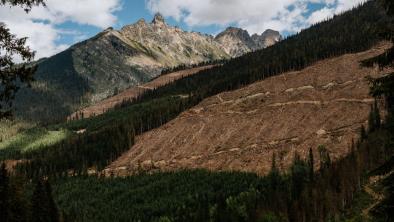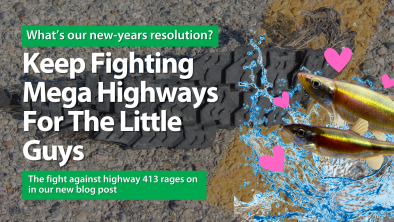Environmental standards should build, not erode
Tuesday, May 22, 2012

Vancouver Sun - Opinion Editorial
By Gwen Barlee
May 22, 2012
Polls repeatedly show Canadians value honesty, accountability and kindness - attributes that are completely missing these days from the federal government's approach to the environment.
A case in point is the government's sweeping budget bill. Tabled on April 26th Bill C-38 dedicates over a third of its 420 pages to rolling back environ-mental legislation that generations of Canadians have fought to establish. Written with no public consultation, the bill wages war on: laws that protect our air and water, regulations to safeguard fish habitat, public participation in environmental assessments, and government oversight of large industrial projects.
Ottawa has cloaked these draconian changes with soothing language. Decimating environ-mental standards is portrayed as providing "certainty" and "efficiency" for industry while gutting conservation laws is characterized as "streamlining" and removing "red-tape." This language is misleading and fundamentally dishonest to the vast majority of Canadians who value clean air and fresh water.
These changes are also harmful to industry. Low environ-mental standards, reduced public participation and increased political interference provide neither certainty nor public support for business. In fact a dramatically weakened regulatory environment is a recipe for litigation, civil disobedience and certain environmental damage.
Accompanying the government's scorched earth approach to environmental laws is rhetoric that tears a page from the Republican playbook of our neighbours to the south. Environmental organizations have been branded as "radical," accused of laundering money and have had their charitable status targeted. Silencing critics through the powers of the state rather than engaging in an informed debate is the new norm.
This is not the Canada in which I was raised; nor the Canada I envision for the future.
The impetus for a dramatically weakened regulatory environment appears to be Western Canada, especially B.C., where proposed pipelines, oil tankers and mines have created the perfect storm of controversy. The concern is particularly charged here because we have so much to lose; after a decade of provincial environmental cuts the federal rollbacks will leave B.C.'s environment with just an illusion of protection. Thousands of miles of coast-line, hundreds of wild salmon rivers and the belief in good government and rule of law hang in the balance.
History has shown us that rock bottom environment standards don't make for better projects, good jobs or healthy communities. Right now the federal government, and tax-payers across the country, are on the hook for $7.7 billion in cleanup costs for over 10,000 contaminated sites ranging from abandoned mines to old fuel spills. Low environmental standards and lax enforcement in the past created this situation and more of the same bad medicine will only make the problem worse.
Ottawa is correct when it says that a regulatory overhaul is needed for environmental laws - but they are headed in the wrong direction. More democracy, enhanced citizen engagement and robustly enforced environmental laws are the cure for what ails us, not the illness.
As a starting point we need to reverse and halt any further cuts to environmental protections. Specifically, habitat protection for fish must be rein-stated in the Fisheries Act and meaningful public participation put back into the Canadian Environmental Assessment Act. But that won't be nearly enough. Sustainability must be at the core of an improved environmental assessment process.
Language to protect our environment must be binding, existing laws properly enforced and the cuts of thousands of staff and tens of millions of budget dollars from Environment Canada, Parks Canada and the Department of Fisheries and Oceans reversed. The Federal government also needs to stop devolving responsibility to the provinces; not only does this raise the spectre of a constitutional challenge in regards to the federal Fisheries Act, it guarantees a patchwork quilt of environmental laws where provinces compete against one another by lowering standards to attract short-term business investment.
Canada needs to regain its place on the world stage. We should start by enacting an Environmental Bill of Rights (EBR). A Canadian EBR would enshrine a statutory right to a healthy environment and impose a legal duty upon the federal government to protect this right. It would also empower Canadian citizens, in limited cases, to take the government to court for failing to uphold environmental laws.
At the end of the day environmental laws should protect the public good. If we want wild salmon, clean air, fresh water and a stable climate in our future then we must have a government that is prepared to make and enforce strong environmental laws.
Let corporations do what they do best - make a profit - but don't expect a mining company or an oil and gas corporation to put the public good or Canadian values ahead of quarterly profits.
Gwen Barlee is the policy director of the Wilderness Committee.


